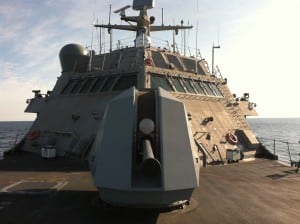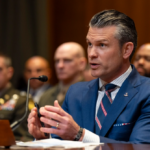
8 Days Left For Congress. Congress will return on Dec. 1 for a final two-week session. In its last eight workdays of 2014, Congress still must pass a budget bill of some sort–the continuing resolution that has kept the government open since Oct. 1 will expire Dec. 11. SAC Chairwoman Barbara Mikulski (D-Md.) says Nov. 21 that she and her House counterpart, Rep. Hal Rogers (R-Ky.), “continue to make steady progress” towards an agreement on an appropriations compromise bill, but both the House and the Senate would have to pass it on the floor for it to go into effect. Many lawmakers also hope to pass the National Defense Authorization Act as well as the Cybersecurity Information Sharing Act, though the full Senate has yet to pass either yet.
House To Examine QDR. HASC will hold a hearing on Dec. 2 to examine the Quadrennial Defense Review (QDR) the Pentagon released earlier this year, which was met with heavy congressional criticism. Two former undersecretaries of defense for policy, Eric Edelman and Michele Flournoy, will testify on behalf of the National Defense Panel that was convened to assess the QDR. The hearing begins at 10 a.m. Also that day, the seapower and projection forces subcommittee will hold a hearing examining the role of maritime and air power in the Defense Department’s third offset strategy it recently announced.
Arizona Recount in December. A recount in the congressional race between Ron Barber (D-Ariz.) and retired combat pilot Martha McSally (R) could start as early as Dec. 1, after the Arizona secretary of state certifies the election results, according to Arizona law. Barber had requested that 133 votes be added to the official count, after his campaign found that as many as 167 votes were improperly rejected during the vote canvassing process, according to a Barber campaign press release. That request was denied by the two counties involved, so Barber filed a lawsuit on Nov. 24 to urge the state to delay the vote certification until they could review the rejected votes. The lawsuit was expected to go to court on Nov. 26.
Building First SSC. Construction has begun on the first Ship to Shore Connector (SSC) the Navy is procuring on behalf of the Marine Corps. Prime contractor Textron is building the next generation of Landing Craft, Air Cushion (LCAC) boats in New Orleans and was greenlighted by the Navy in October to begin fabrication after reviewing the design. “Starting production on this next generation Landing Craft, Air Cushion (LCAC) is a significant milestone for the Navy and Marine Corps,” says Capt. Chris Mercer the program manager for amphibious warfare in PEO Ships at Naval Sea Systems Command (NAVSEA). The new SSC will be capable of carrying 74 tons at speeds exceeding 35 knots. The Navy plans to buy 73 SSCs.
SEWIP for LCS? The Navy is examining the possibility of deploying a scaled down version of the Surface Electronic Warfare Improvement Program (SEWIP), designed to detect potential surface threats, on the LCS. The LCSs have been criticized for not being sufficiently survivable, and SEWIP could help alleviate some of those concerns. The Navy plans to test SEWIP on the first LCS, the USS Freedom, in December. SEWIP is a evolved development and block upgrade program for the SLQ-32 electronic warfare system, will be designated as SLQ-32C(V)6 and is still in the early stages. SEWIP is deployed n Navy aircraft carriers, cruisers, destroyers and other warships. The upgraded version will be known as AN/SLQ-32(V)6.
1001. The second of the Navy’s Zumwalt-class (DDG-1000) land attack destroyers, the future USS Michael Monsoor (DDG-1001), has been integrated with its composite deckhouse at builder General Dynamics Bath Iron Works. The deckhouse was built by Huntington Ingalls Industries. “This is a major milestone for the ship and the program as the Michael Monsoor continues construction and prepares to enter the test & activation phase on the heels of DDG 1000,” says Capt. Jim Downey, the Zumwalt class program manager at NAVSEA. Construction of the ship is 79 percent complete and delivery is scheduled for 2017.
Border Arguing. The House Homeland Security Committee on Tuesday Dec. 2 will host Homeland Security Secretary Jeh Johnson to hear the Obama administration’s case for executive action on immigration reform. To what degree the committee is interested in listening to Johnson might be debatable given the title of the hearing, “Open Borders: The Impact of Presidential Amnesty on Border Security.” Committee Chairman Michael McCaul (R-Texas) says in a hearing advisory that “The president’s decision to bypass Congress and grant amnesty to millions of unlawful immigrants is unconstitutional and a threat to our democracy. There is no doubt our immigration system is broken and needs to be fixed, but this does not mean the president has the authority to act without Congress.”
Expanding in America. Australia’s Varley Group, an advanced engineering company, has launched a subsidiary in the United States to expand the company’s business here. Varley U.S.A. will be headquartered in Washington, D.C., and will focus in three key areas: aerospace and defense; specialized vehicles; and advanced electric motor and generator technologies. The company says the U.S. business will also be on the lookout for acquisitions of U.S. companies.
Cyber Workforce Development. Continuing its push to further develop the base of cyber security talent, the Department of Homeland Security has launched the 2015 Secretary’s Honors Program Cyber Student Volunteer Initiative for current two- and four-year college students to complete volunteer assignments supporting the department’s cyber mission at field offices in over 50 locations across the country. Through the initiative, “students gain firsthand experience in applying their skills directly to our wide-ranging efforts, from helping to defend the nation’s cyber networks against attacks to going after criminals who exploit innocent members of the public,” says Alejandro Mayorkas, deputy secretary of DHS.
Faster, FAA, Faster. Five senators penned a letter to the Federal Aviation Administration this week urging the agency to speed up the process of licensing users to operate small drones in national airspace. The senators included Ron Wyden (D-Ore.), Jeff Merkley (D-Ore.), Heidi Heitkamp (D-N.D.), John Hoeven (R-N.D.) and Cory Booker (D-N.J.). They acknowledge the difficult task the FAA, already behind schedule, is undertaking in certifying the use of drones in national airspace, but say the lag is restraining the positive economic gains that could be made with the production of the aircraft for domestic use. “We remain concerned about the impacts that continued delays in the process are having on the American UAS industry and the national economy, and the safety risk posed by expanding unlicensed operations,” the Nov. 25 letter says.

 By
By 











